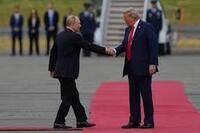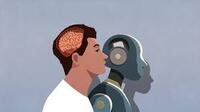Arnon Grunberg's Blog, page 6
August 22, 2025
Authors
 Delight
DelightOn reading – Maggie Astor in NYT:
‘Any reader knows the unique delight of settling down with a good book.
But over the past two decades, there has been a steady decline in Americans who read for fun, according to a study published on Wednesday.
Researchers from University College London and the University of Florida examined national data from 2003 to 2023 and found that the share of people who reported reading for pleasure on a given day fell to 16 percent in 2023 from a peak of 28 percent in 2004 — a drop of about 40 percent. It declined around 3 percent each year over those two decades.’
(…)
‘The study did not answer the question of why Americans were reading less. But the authors suggested some possible explanations, including increased use of social media and other technology, or more time spent at work because of economic pressure. Further research would be needed to confirm those theories.’
(…)
‘The findings showed significant demographic disparities among those who read for pleasure. For example, in 2023, the most highly educated people were more than twice as likely to read as the least educated, and high-income people were about 1.5 times as likely to read as low-income people. Those disparities widened over time.’
(…)
‘Jill Sonke — a co-author of the new paper and a director of the EpiArts Lab at the University of Florida, which studies how engagement in the arts and culture affects health — said she would like to see more awareness that reading is a resource “for our health and well-being.”“As we’re living in this really complex and really challenging time, we really need to be intentional about the ways in which we support our health,” Dr. Sonke said.’
(…)
‘But discussing and reflecting on fiction — as opposed to just reading it — was linked to better mental health and social capabilities, including the ability to perceive nuances in interpersonal relationships, said Dr. Carney, who was not involved in the new study. Engaging with many forms of nonfiction would probably have similar benefits, he said.’
Read the article here.
The benefits, always the benefits.
I said it before, recently in a Swiss newspaper, reading will become a pastime for pariahs.
‘A pastime for a small group of people who happen to understand the perverse delights of reading what’s just tolerated, mainly because literature seems so insignificant to the powers that be. Literature should become, once again, the favorite pastime of pariahs.’
You can read the article here.
August 21, 2025
Safety
 Proliferation
ProliferationOn charismatic megatraumas - David Wallace-Wells in NYT:
‘In 2023 — just as ChatGPT was hitting 100 million monthly users, with a large minority of them freaking out about living inside the movie “Her” — the artificial intelligence researcher Katja Grace published an intuitively disturbing industry survey that found that one-third to one-half of top A.I. researchers thought there was at least a 10 percent chance the technology could lead to human extinction or some equally bad outcome.
A couple of years later, the vibes are pretty different. Yes, there are those still predicting rapid intelligence takeoff, along both quasi-utopian and quasi-dystopian paths. But as A.I. has begun to settle like sediment into the corners of our lives, A.I. hype has evolved, too, passing out of its prophetic phase into something more quotidian — a pattern familiar from our experience with nuclear proliferation, climate change and pandemic risk, among other charismatic megatraumas.’
(…)
‘This week the longtime A.I. booster Eric Schmidt, too, shifted gears to argue that Silicon Valley needed to stop obsessing over A.G.I. and focus instead on practical applications of the A.I. tools in hand. Altman’s onetime partner and now sworn enemy Elon Musk recently declared that for most people, the best use for his large language model, Grok, was to turn old photos into microvideos like those captured by the Live feature on your iPhone camera. And these days, Aschenbrenner doesn’t seem to be working on safety and catastrophic risk; he’s running a $1.5 billion A.I. hedge fund instead. In the first half of 2025, it turned a 47 percent profit.
So far, so normal. But there is plenty that already feels pretty abnormal, too. According to some surveys, more than half of Americans have used A.I. tools — a pretty remarkable uptake, given that it was only after the dot-com crash that the internet as a whole reached the same level. A third of Americans, it has been reported, now use A.I. every single day. If the biggest education story of the year has been the willing surrender of so many elite universities to Trump administration pressure campaigns, another has been the seeming surrender of so many classrooms to A.I., with high school and college students and even their teachers and professors increasingly dependent on A.I. tools.’
(…)
‘Venture capitalists now like to talk about embodied A.I., by which they mean robots, which would be a profound shift from software to hardware and even infrastructure; in Ukraine, embodied A.I. in the form of autonomous drone technology is perhaps the most important front in the war.’
(…)
‘This isn’t a blueprint of the world to come, just one speculative glimpse. Perhaps the course of the past year should reassure us that we’re not about to sleepwalk into an encounter with Skynet. But it probably shouldn’t give us that much confidence that we have all that clear an idea of what’s coming next.’
Read the article here.
In war and education ai is going to be important.
A professor told me that thanks to ai the papers of most of his students contained less nonsense but the dullness was immense.
I predicted that AI will win the Nobel in literature, but maybe it will win the Nobel Peace Prize first.
August 20, 2025
Victims
 Rain
RainOn the supposed turning of the tide – Adam Shatz in LRB:
“A few weeks later, we trudged through the rain and the cold to the villa where the Wannsee Conference was held. The guide, well-informed and energetic, told us that some industrial magnates who thought they could control Hitler had attended the conference, at which the implementation of the Final Solution was discussed. Whether or not the regime in the US is best described as ‘fascist’, it was hard not to think about Trump, Musk, Stephen Miller and their new friends Zuckerberg and Bezos. The basic governing coalition hasn’t changed all that much: thugs, zealots, careerists, entrepreneurs and grifters. As we left, we were told that there was a café. Run by an Israeli woman, it was advertised by a sign reading: ‘Enjoy Jewlicious babka.’”
(…)
“To assimilate into German society, the children of Muslim immigrants are discouraged from identifying with the country’s Jewish victims and instructed instead to think of themselves as potential perpetrators of genocide against Jews. As the anthropologist Esra Özyürek argued in Subcontractors of Guilt: Holocaust Memory and Muslim Belonging in Postwar Germany (2023), the Holocaust education programmes designed for Muslim students imply that their ancestors also bear responsibility for the Judeocide, and give highly exaggerated accounts of Muslim antisemitism and collaboration (the Palestinian grand mufti of Jerusalem during the British Mandate, Hajj Amin al-Husseini, figures prominently here, as he does in Netanyahu’s speeches). While immigration has provoked widespread anger in Germany and helped foster the rise of the far-right AfD, the presence of an increasingly large Muslim population has also helped relieve German society of the burden of memory, allowing it to shift the blame for antisemitism to people of Middle Eastern origin, and thereby reaffirm Germany’s vigilance in facing up to its past. It’s the flip side of ‘memory culture’. As both the AfD and the Christian Democrats have learned, so long as you condemn Muslim antisemitism, you can continue to attack the ‘ills’ of immigration, as if xenophobia and racism had no connection to the German past.”
(…)
“She arrived carrying a tiny dog. It can’t bear to be alone, she said; it growled when I tried to pet it. It soon became clear that she’d come not only with her dog, but with a small army of supporters, who clicked their fingers loudly after every remark she made. ‘I will get in trouble for saying this in Germany,’ she declared, before describing the Holocaust as little more than European colonial violence inflicted on fellow Europeans, a symptom of the ‘boomerang’ effect evoked by Aimé Césaire in Discourse on Colonialism. I said that neither Césaire nor Fanon had minimised the horror of the Nazi genocide.”
(…)
“Throughout my stay in Berlin, I kept hearing from Germans quietly critical of Israel that ‘cracks’ had begun to appear in Staatsräson. These cracks sometimes assumed unsettling forms, notably a relief at shedding the burden of Holocaust memory, as if Palestine was an invitation to bury the Holocaust, at last, rather than to apply its lessons to the destruction of Gaza. A woman I know told me that a friend, an American Jew, had broken up with her German boyfriend after he told her that he found the Holocaust too painful to engage with, and therefore didn’t. When she suggested that they visit a site of Holocaust remembrance in Berlin, he started talking about Gaza, angrily telling her that he no longer supported Israel’s war, and that most Germans agreed with him. When she challenged him over his refusal to engage with difficult subjects like the Holocaust, he burst into tears and ran off.”
(…)
“Between 7 October 2023 and 13 May this year, according to Reuters, Germany had granted export licences for military equipment worth €485 million. Will anyone be left in Gaza to benefit from the supposed turning of the tide?”
Read the article here.
Jewlicious babka, the Shoah and heartbreak.
The end of memory culture, it has been said before, most notably by the Dutch historian David Wertheim who declared Auschwitz dead, is coming closer.
The dead of memory culture or not, there will always be worthy and less worthy victims.
August 19, 2025
Copies
 Authorities
AuthoritiesOn the other and the graphic novel - Sheren Falah Saab in Haaretz:
‘Egyptian comics creator Magdy El-Shafee is considered a graphic novel pioneer in the Arab world, rising to prominence thanks to "Metro," a graphic novel published in 2008, which reflects the situation in Cairo at the beginning of the 21st century.
The plot follows a father, a young programmer frustrated by the economic and political situation. After he robs a bank, he flees into the Cairo subway system, which becomes a setting for grim observation of social anger, corruption and the younger generation's existential distress. The dynamic and rhythmic illustrations in a black-and-white style take their inspiration from dark films and correspond with the Western comic tradition.
Shortly after "Metro" was published, the Egyptian authorities banned the book, citing that it "harms public morals" and "contains false information." El-Shafee was tried and fined, and all of the copies of the book were confiscated from stores in Egypt. That censorship turned "Metro" into the first Arab graphic novel to gain international prominence, and it was translated into several languages, including English and French.’
(…)
‘"The security man asked me whether I had visited Ramallah or was acquainted with the author. But then he also asked, and I think he really didn't understand, 'Why are you, as a researcher of Israeli literature, interested in Palestinian literature?' This only brought into focus a sense I had that it's important that this book and others arrive in Israel with me and become part of my lectures and classes."
She stresses that "In comic books, one can show very difficult subject matters, such as famine, genocide and sexual assault, but it's different than seeing things directly on video or in still photographs. Something about comics makes it more distant, perhaps sometimes softer, allowing people to contain the pain."
Sabaaneh's book is a prime example of this, as Schory explains. "Few people, in Israel or abroad, dare to look directly at what has been happening in jails in Israel and the territories. It's a terrible reality, very hard to look at, but it's so important that we know. Once the experience is also aesthetic and indirect, with the illustrations all very impressive linoleum engravings, it's possible to look straight at it, even to identify with someone other than oneself."’
(…)
‘Why are you interested mainly in graphic novels from the Palestinian arena?"I feel it's closest to me, and I'm also interested in how we appear to Palestinian creators. Israelis, especially in the form of the Israeli military, are in almost every book.
This is, of course, true for Sabaaneh, but also for Abdelrazaq when she recounts her family's Nakbah story – her family was expelled from the village of Safsaf to refugee camps in Lebanon. When she illustrates her family, their faces are drawn in loving, detailed lines. The Israeli soldiers, by contrast, will always be a black armed silhouette with a wide evil grin."’
Read the article here.
How the others see us, that’s what everybody should be interested in.
Then also, you will know more about ‘harming public morals’.
August 17, 2025
Meeting
 Question
QuestionOn the future - Zvi Bar'el in Haaretz:
‘When Hulileh was asked in an interview on the UAE television station Al-Mashhad about the cost of rebuilding Gaza, he mentioned that in February, the World Bank had estimated the reconstruction costs at $53 billion – "but since then, the Strip has suffered major destruction caused by Israel, and it appears that the real amount is about $60 billion."
Hulileh, who isn't deterred by such a sum, noted that the World Bank based its estimate on costs that are customary in the West, whereas the costs in Gaza would be expected to be substantially lower, mainly due to the lower cost of labor. When asked how long reconstruction would take, he cited an example from Egypt, which managed to build entire cities in three to five years. As he sees it, the reconstruction of Gaza is the most relevant and most practical question that there is.’
(…)
‘Al-Hayya stated publicly that the goal of the meeting was to draft terms for a permanent cease-fire, that is, to end the war and to bring humanitarian aid into Gaza. According to Egyptian sources, the goal is more ambitious, and includes discussion of a 'broad" plan that would include disarming Hamas and handing its weapons to the PA, establishing a temporary six-month management body to replace Hamas in the Gaza Strip and launching operations to restore civilian infrastructure.
This is not a new plan. In March, Egypt presented a document detailing the steps of this plan, which was quickly put together to thwart the threat of mass transfers and U.S. President Donald Trump's vision for a Gazan "Riviera." Since then, in the face of strong Arab and international opposition to the initiative, Trump has "agreed" to hear other ideas.’
(…)
‘Trump has, for the time being, committed to the Israeli position, which opposes the PA's participation in the administration of Gaza. At the same time, Abbas is insistent that only the PA should be the source of authority for any agreement on Gaza's future.
However, a senior official in Abbas' Fatah party, who was previously involved in Egyptian-mediated reconciliation talks between the PLO and Hamas, maintains that Abbas isn't left with many other options.
"We have two options," the senior Fatah official told Haaretz. "Adopting the Egyptian plan, even if the PA's role in it is minimal, or opposing it and being the ones who pave the way for Israel to occupy the Strip. That is a worthy national position, but it's also the approach that would lead to disengagement from Gaza."’
Read the article here.
60 billion dollars to rebuild. Peanuts.
The problem is that Israel, with the help of some obstinate Palestinians, will do everything to undo the rebuilding.
There are no signs that after Netanyahu a true enlightened leader will be elected in Israel.
But who knows, maybe Trump is willing, in between flattering Putin, to pressure Bibi to end the war that now has only purpose, to prolong the political life of Bibi.
Jazz
 Visionary
VisionaryOn Crumb – Michael Saler in TLS:
‘Robert Crumb’s life is an open comic book. With Zap Comix (1968), he launched the underground comics movement promoting uninhibited self-expression. This was exemplified by his satirical exposés of the hypocrisies of American culture and his riven personality, which contains multitudes. His surreal, frequently scatological tales combine the intricate cross-hatching of nineteenth century political cartoonists such as Thomas Nast with the goofy simplicity of Disney’s “funny animal” comics. In his infamous “Joe Blow” (Zap #4, 1969), he illustrated in unsparing detail the ideal American family united through incest (the issue became the first comic book to be declared obscene in the US); his last major work is a painstaking rendering of the book of Genesis (George Lucas purchased the original artwork in 2015 for $2.9 million).’
(…)
‘Chuck and Bea were outwardly model citizens, but behind closed doors they fought frequently, sometimes bloodily. Bea’s mental health deteriorated in the early 1950s; Chuck, tolerant of his obedient daughters, berated his three unruly sons for being unmanly and disrespectful. He struck five-year-old Robert, causing him to fall and break his collarbone, and repeatedly beat Robert’s elder brother, Charles, whom he may have guessed was homosexual. (Nadel suggests this may have been true for Chuck as well.) Monsters, yes: yet Nadel humanizes both parents by excavating their difficult lives and failed dreams.
Like the Brontës, the Crumb children survived their American gothic childhood by withdrawing into co-created imaginary worlds. Charles marshalled his three younger siblings into producing numerous comics through the 1950s and was Crumb’s acknowledged mentor, teaching him to draw fluently and rapidly. The brothers were ardent Catholics as children, but lost their faith during their teens: comics fandom replaced religion.’
(…)
‘His character “Mr. Natural”, a cynical eastern-type guru who enjoys bilking consumers of the postwar spiritual marketplace, is sometimes the real deal, spouting koans of genuine insight.’
(…)
‘Much of the imagery from this period is misogynist: Crumb gradually came to that conclusion himself. The early underground comprised young men who supported sexual liberation insofar as it helped them to get laid. But it also inspired women such as Trina Robbins and Aline Kominsky to create their own comics, extending the movement’s appeal and influence. (Aline would become Crumb’s second wife after a messy divorce in 1977.)
The underground lost its impetus after 1973, hobbled by new censorship laws and the decline of the counterculture. Burnt out after years of overwork, Crumb quit drugs, played more jazz and rethought his approach. The underground excelled at autobiographical narratives, so he began to pay closer attention to his life, changing from “door-busting visionary to contemplative chronicler of the everyday”. This was evident in Weirdo, a magazine for “adult intellectuals” that he launched in 1981. In addition to searching, self-deprecatory stories of his conflicted life, he illustrated the lives and works of artists he admired or identified with, including James Boswell, Jean-Paul Sartre and Philip K. Dick.’
(…)
‘Much of the imagery from this period is misogynist: Crumb gradually came to that conclusion himself. The early underground comprised young men who supported sexual liberation insofar as it helped them to get laid. But it also inspired women such as Trina Robbins and Aline Kominsky to create their own comics, extending the movement’s appeal and influence. (Aline would become Crumb’s second wife after a messy divorce in 1977.)
The underground lost its impetus after 1973, hobbled by new censorship laws and the decline of the counterculture. Burnt out after years of overwork, Crumb quit drugs, played more jazz and rethought his approach. The underground excelled at autobiographical narratives, so he began to pay closer attention to his life, changing from “door-busting visionary to contemplative chronicler of the everyday”. This was evident in Weirdo, a magazine for “adult intellectuals” that he launched in 1981. In addition to searching, self-deprecatory stories of his conflicted life, he illustrated the lives and works of artists he admired or identified with, including James Boswell, Jean-Paul Sartre and Philip K. Dick.’
Read the article here.
Where have the adult intellectuals gone?There is only one life, the conflicted life.
And now, waiting for Mr. Natural.
August 16, 2025
Loquacious
 Choice
ChoiceOn impressive diplomacy – David E. Sanger in NYT:
‘Mr. Zelensky may yet have to make that choice. But Mr. Trump lifted off from Alaska, ahead of schedule, without having achieved the most basic first step: a temporary cease-fire that would allow further negotiations to take place. It was exactly the outcome, he told reporters earlier on Friday, with which he would not “be happy.”’
(…)
‘But the fact that the two men were not willing to take a single question from reporters — a rarity for the loquacious Mr. Trump, always eager to describe his latest deal, or near-deal — made clear that there was little to talk about, at least for now.’
(...)
‘Most of all, gone was any hint of Mr. Putin’s status as an international pariah, a leader who could not land in most European countries for fear that he might be detained by officials acting on the arrest warrant issued against him for how the war in Ukraine was conducted.
To those who have followed Mr. Trump’s diplomacy, this meeting seemed to have a natural comparison: Mr. Trump’s first encounter seven years ago with Kim Jong-un of North Korea, which was marked by embraces, handshakes, letters testifying to their mutual admiration — and a continued buildup of the North’s nuclear arsenal.’
(…)
‘But in the meantime, Mr. Putin has accomplished a major war goal: He has gotten out of the box of sanctioned autocrat, and was greeted by the president of the United States as a peacemaker. He has bought time. He has defused all that talk of sanctions on his oil sector. And he gave up nothing.
It’s unclear how long any of that will work. But it was impressive diplomacy for less than four hours on American ground.’
Read the article here.
Impressive diplomacy, indeed.
Handshakes and then back to the war, or preparing for the war (North Korea).
Ukraine, merely an afterthought.
August 15, 2025
Sanctions
 Step
StepOn great men – The Economist:
‘For months, as Mr Putin made a mockery of Mr Trump’s promises to end the war in a day and of his calls for a ceasefire, the president who once threatened “fire and fury” against North Korea and tariffs as high as 245% against China indulged in no such bluster. He has sounded less formidable than plaintive. “Vladimir, stop!” he wrote on social media in April. His use of the given name betrayed a touching faith that their shared intimacy would matter to his reptilian counterpart, too.
When Mr Putin kept killing Ukrainians, Mr Trump took a step that was even less characteristic: he admitted to the world that he had been played for a fool. “Maybe he doesn’t want to stop the war, he’s just tapping me along,” he mused on April 26th. A month later, he ventured that his friend must have changed, gone “absolutely crazy!” Then on July 8th he acknowledged what should have been obvious from the start: “He is very nice all the time, but it turns out to be meaningless.” Mr Trump threatened secondary sanctions on Russia but then leapt at Mr Putin’s latest mixed messages about peace, rewarding him with a summit in America.’
(…)
‘The exhaustive report released in 2019 by an independent counsel, Robert Mueller, affirmed on its first page that “the Russian government perceived it would benefit from a Trump presidency and worked to secure that outcome.” Mr Mueller indicted numerous Russians, and he also secured guilty pleas from some Trump aides for violating various laws. But he did not conclude the campaign “conspired or co-ordinated” with the Russians.
To wade through the report’s two volumes is to be reminded how malicious the Russians were and how shambolic Mr Trump’s campaign was. It is also to lament the time and energy spent, given how little proof was found to support the superheated suspicions. And it is to regret how little Mr Trump was accorded a presumption of innocence. In the final words of the report, Mr Mueller noted that while it did not accuse Mr Trump of a crime, it also did “not exonerate him”. One might understand his bitterness.’
(…)
‘Since the 1930s a cornerstone of American foreign policy has been that no country can gain territory by force, a principle also enshrined in the charter of the United Nations. Yet in his first term, in pursuit of his vision of Middle East peace, Mr Trump twice granted American recognition of conquered territory, for Israel’s claim to the Golan Heights and Morocco’s claim to Western Sahara. He appears to envisage an end to the war in Ukraine that would also award Russia new territory.
This is how “savvy” people like Mr Trump and Mr Putin believe the world actually works, or ought to: not according to rules confected by stripy-pants diplomats to preserve an international order, but in deference to power exercised by great men.’
Read the article here.
Great men dividing the world according to their taste and their needs.
Diplomacy and the rule of (international) law are for lesser gods.
The jungle is still very seductive.
August 14, 2025
Policy
 Change
ChangeOn super intelligence – Cal Newport in The New Yorker:
‘Suddenly, the theoretical idea of artificial general intelligence, which performs as well as or better than humans on a wide variety of tasks, seemed tantalizingly close. If the scaling law held, A.I. companies might achieve A.G.I. by pouring more money and computing power into language models. Within a year, Sam Altman, the chief executive at OpenAI, published a blog post titled “Moore’s Law for Everything,” which argued that A.I. will take over “more and more of the work that people now do” and create unimaginable wealth for the owners of capital. “This technological revolution is unstoppable,” he wrote. “The world will change so rapidly and drastically that an equally drastic change in policy will be needed to distribute this wealth and enable more people to pursue the life they want.”’
(…)
‘Then, last week, OpenAI finally released GPT-5, which many had hoped would usher in the next significant leap in A.I. capabilities. Early reviewers found some features to like. When a popular tech YouTuber, Mrwhosetheboss, asked it to create a chess game that used Pokémon as pieces, he got a significantly better result than when he used GPT-o4-mini-high, an industry-leading coding model; he also discovered that GPT-5 could write a more effective script for his YouTube channel than GPT-4o. Mrwhosetheboss was particularly enthusiastic that GPT-5 will automatically route queries to a model suited for the task, instead of requiring users to manually pick the model they want to try. Yet he also learned that GPT-4o was clearly more successful at generating a YouTube thumbnail and a birthday-party invitation—and he had no trouble inducing GPT-5 to make up fake facts. Within hours, users began expressing disappointment with the new model on the r/ChatGPT subreddit. One post called it the “biggest piece of garbage even as a paid user.” In an Ask Me Anything (A.M.A.) session, Altman and other OpenAI engineers found themselves on the defensive, addressing complaints. Marcus summarized the release as “overdue, overhyped and underwhelming.”’
(…)
‘Last week, researchers at Arizona State University reached an even blunter conclusion: what A.I. companies call reasoning “is a brittle mirage that vanishes when it is pushed beyond training distributions.” Beating these benchmarks is different from, say, reasoning through the types of daily problems we face in our jobs. “I don’t hear a lot of companies using A.I. saying that 2025 models are a lot more useful to them than 2024 models, even though the 2025 models perform better on benchmarks,” Marcus told me. Post-training improvements don’t seem to be strengthening models as thoroughly as scaling once did. A lot of utility can come from souping up your Camry, but no amount of tweaking will turn it into a Ferrari.’
(…)
‘If these moderate views of A.I. are right, then in the next few years A.I. tools will make steady but gradual advances. Many people will use A.I. on a regular but limited basis, whether to look up information or to speed up certain annoying tasks, such as summarizing a report or writing the rough draft of an event agenda. Certain fields, like programming and academia, will change dramatically. A minority of professions, such as voice acting and social-media copywriting, might essentially disappear. But A.I. may not massively disrupt the job market, and more hyperbolic ideas like superintelligence may come to seem unserious.’
(…)
‘The whole enterprise of teaching computers to think remains mysterious. We should proceed with less hubris and more care.’
Read the article here.
Less hubris, more care.
What else is new?
We have been waiting for the paradigm shift, maybe in vain.
In the meantime, the armies are playing with AI for their war games and hoping that superintelligence will bring total victory closer.
August 13, 2025
Law
 Post
PostOm killing journalists – Nagham Zbeedat in Haaretz:
‘Just weeks after urging the world to protect journalists in Gaza, Al Jazeera correspondent Anas al-Sharif was killed when an Israeli airstrike hit his tent in Gaza City. According to Al Jazeera, Al-Sharif was killed along with his colleague, Mohammed Qreiqeh, and cameramen Ibrahim Zaher, Mohammed Noufal and Moamen Aliwa.’
(…)
‘In a posthumous message posted on X, al-Sharif wrote that if this post is up, then "Israel has succeeded in killing me and silencing my voice."’
(…)
‘International human rights groups, press freedom advocates and journalists' unions condemned the killing as another blow to media coverage in Gaza and a grave violation of international law. The Committee to Protect Journalists and Reporters Without Borders called for an independent investigation.
Award-winning American war correspondent Janine di Giovanni, who has reported from many conflict areas, including Ukraine, Sudan, Syria and Gaza, wrote that "nothing compares to Gaza - or the complicity letting it happen. This is the intent to erase Palestinians - and we are watching it happen. This must stop. Now."’
(…)
‘In an interview with Egyptian outlet al-Qahera News, Mohammad Abu-Salmiyal, director of Al-Shifa Hospital (located directly opposite the journalists' tent) called the strike "another crime added to the list of crimes committed by the Israeli occupation." He said: "This crime aims to erase the truth amid the severe threats launched by the occupation during its invasion of Gaza City. They do not want any voices left inside Gaza to convey the truth to the world."’
Read the article here.
They don’t want any witnesses left. What else is there to say? Messianism without witnesses.
Or let’s say, only certain witnesses.
Arnon Grunberg's Blog
- Arnon Grunberg's profile
- 415 followers



